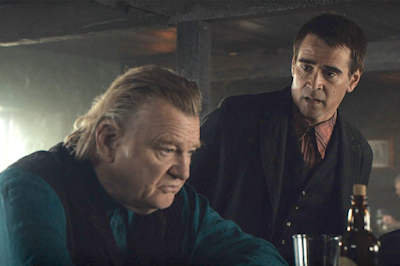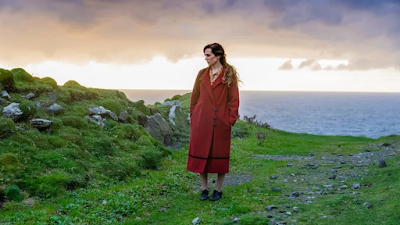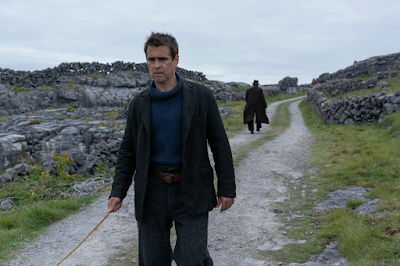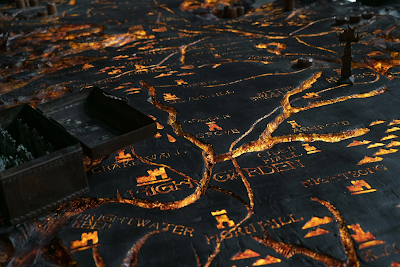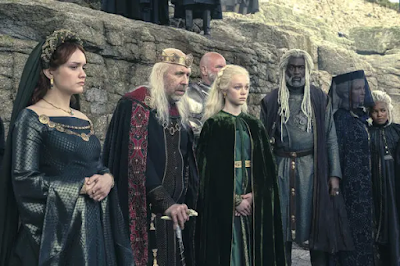Most of the time, there's a lot to like about Darren Aronofsky's films. He's not afraid to take risks. All of them tend to carry his brutally realistic perspective about life, which is still layered with a level of mysticism or fantasy that makes you wonder if that "real life" image is, instead, just on the edge of reality. His style is so distinctive that it's immediately obvious when you're watching his work. That remains true about The Whale, his latest effort which has drawn both enormous praise and enormous criticism. I find the former perfectly understandable. I find the latter to be largely performative and absurd.
Like some of his other works (Requiem for a Dream, The Wrestler), this is a very blunt story about the emotional struggles of a man who has decided to take revenge upon himself by turning into his (and much of society's) image of a grotesquerie. He has decided that because of his failures with his wife, his daughter, his dead lover, and his own estimation of what he hasn't done with his life, he will turn himself into something that everyone will physically recoil from, despite the constant evidence of the people who don't recoil but whom instead care deeply about him, from the nurse that comes daily to his home to tend to him to the pizza delivery guy whom he never sees, but who still feels human concern for the well-being of his best customer. Charlie (Brendan Fraser) is so consumed with guilt and despair over the loss of the love of his life that he has decided that he can't be loved at the same time that he's trying to reconcile with his daughter that he hasn't seen in eight years to give himself some reassurance that he's done something positive in his life. If that sounds like an incredibly complicated and, thus, very human character then you're absolutely right. Charlie is the titular "Whale" and, like Moby-Dick, an essay about which is one of his fascinations, his bodily condition is simply a cipher for the emotional trauma of Charlie and all the other characters around him. In the same way that the novel isn't about whale hunting, but instead about obsession, perception, and perspective, the film isn't about the tragedy of fat people, but rather the tragedy of trying to be something that you aren't and trying to make up for the hurt you've caused people as you try to get to that better understanding of self.
This is, without question, Brendan Fraser's best performance of his career. The anguish and self-loathing and doubt that he exudes at every moment conveys a more realistic character than he's ever been given to portray. There is raw emotion at every moment that he's onscreen, which is 99% of the film. It's quite easy to see that it's based on a play, as almost all of it takes place in one room and with a very small cast, which means that it would be far easier to produce on a stage. But Fraser's performance is also indicative of that theatrical underpinning, simply because it's obvious that the character was written to hurl his emotions to the far corners of a room and without the assistance of a three-story screen. Similarly, Liz (Hong Chau) and Ellie (Sadie Sink) both give excellent depictions of the nurse who's lost her brother to her father's distorted religion and the daughter whose inflammatory behavior is a constant signal of how she's been wronged by her father, respectively. Chau's smoldering anger at the injustice of her sibling's death and the equivalent self-destruction by his lover is brilliant mostly for its restraint. It's never absent from her performance but it doesn't overwhelm it, either. She is the constant rock that she was unable to be for her brother and, if she's honest with herself, knows she'll be unable to be for Charlie, as well. Sink presents initially as the rude and insouciant teenager, but she quickly reveals a deeper understanding of life, well beyond the screen of her phone (One could almost call it "Ishmael-like".) Like Charlie, at moments she drips with anguish over what her father has robbed her of, but at other times she's almost sadistically pleased to be exposing all of the illusions that everyone around her is cloaking themselves with. Thomas (Ty Simpkins), a fervent missionary who feels that "saving" Charlie has become his calling, is no different in this respect and becomes the most amusing of the four of them because he's so earnest in his attempts to hide what he feels that he is, while urging everyone around him to find the truth that he sees (or has been conditioned to see) in religion.
The overarching theme of honesty should be obvious here, from the images that these characters try to convey to their frequent blunt admission of what they're trying so hard to deny; from Charlie's marriage to Mary (Samantha Morton) solely to bring a child into the world to Ty's flight from what his parents want him to be to Ellie's show of disdain and contempt for the world when all she really wants is her daddy, all of these people and situations speak to the difficulties in trying to come to grips with oneself, both who you are and whom you want to be. Unfortunately, a lot of that is being overshadowed by a critical response that, like many of these characters, is largely performative. Many critics' objection to Charlie being displayed as an object of scorn, disgust, and derision is spectacularly missing the forest for the trees. These are the people who think Moby-Dick was about whale hunting because it had a great, white whale, rather than being about the humanity of the characters that pursued said whale. The message of the film isn't about "fat people". It's just about people; one of whom happens to be fat. Is the reaction of Dan the pizza guy (Sathya Sridharan) and Charlie's students to his appearance a little overblown? Probably. Most people don't visibly flinch at the sight of someone who's obese. But has society trained many of us to look at heavyset people as objects of derision? Wait. Are we being honest here? Oh, yes, it has. Charlie has decided to eat himself to death because of the guilt and contempt for himself that suffuses him. He's turned himself into what he and much of society see as an object of scorn. That's the point. At the same time, his estranged daughter and ex-wife and friend who half-blames him for the death of her brother still love him and want him to be in their lives, no matter what size he is. The fact that he's fat is a metaphor for many things in the story. It shouldn't be a target for the performative outrage of critics over anything even mildly controversial. Or, for that matter, anything even mildly honest.
This is the best thing we've seen this year and is absolutely worth the time. Outstanding.



